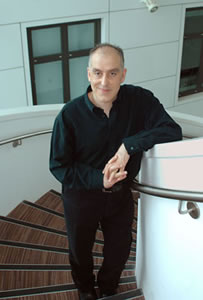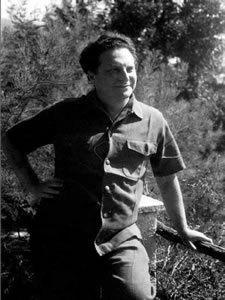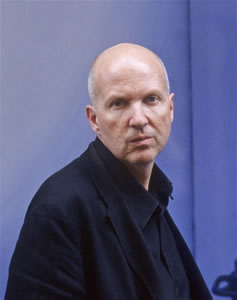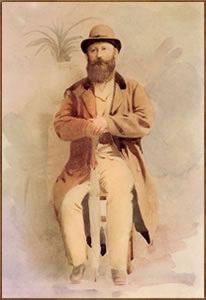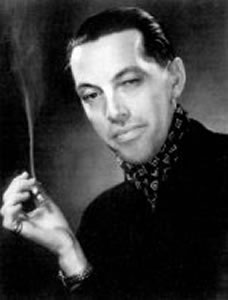De Belgische schrijver Jean-Philippe Toussaint werd op 29 november 1957 geboren in Brussel. Zie ook mijn blog van 29 november 2006 en ook mijn blog van 29 november 2007.
Uit: De Televisie (Vertaald door Marianne Kaas)
”Toen we Cafe Einstein uitkwamen waren we lichtelijk aangeschoten, John en ik. Een paar seconden geleden had John afscheid van me genomen (hij was weer op zijn fiets gestapt en ik had hem nagekeken terwijl hij wegreed in de nacht), en nu wachtte ik in mijn eentje in de Kurfurstenstrasse op een taxi. Aan de overkant van de straat, in het schijnsel van een lantaarn, stond een tippelaarster, gekleed in corselet, te wachten tot ze door een auto zou worden opgepikt, haar dijen en heupen naakt onder het dunne netweefsel van haar zijden kousen, en ik trachtte me een leergierige houding te geven tegenover haar op het troittoir.
Terwijl ik bleef turen naar een denkbeeldige taxi aan het einde van de straat, kon ik het af en toe toch niet laten om een vluchtige blik te werpen op het schaars geklede meisje dat daar tegenover me stond te wachten in de nacht, maar ondanks de zeer lichte dronkenschap die mijn slapen omhulde, voelde ik me op geen enkele wijze fysiek tot haar aangetrokken, niet dat ze lelijk was of juist wel, dat was het punt niet, naar die maatstaf gemeten was ze non-existent, gezichtloos en identiteitsloos, totaal opgesloten in het meest stereotiepe beeld van haar functie, rijzig, blond en atletisch lichaam, niet meer dan dat, met een weelde van even ogenschijnlijk opwindende als bedroevend conventionele erotische parafernalia, getailleerd corselet en sjofel rood leren jackje dat een ontmoedigende klinische kilte uitstraalde.”
Jean-Philippe Toussaint (Brussel, 29 november 1957)
De Engelse dichter en schrijver Mario Petrucci werd geboren op 29 november 1958 in Londen. Hij studeerde o.a. natuurkunde en Milieuwetenschappen aan de Middlesex University. Tegenwoordig is hij niet alleen dichter, maar ook voordrachtskunstenaar, essayist, songwriter, radiopresentator en organisator. Hij won vier maal de London Writers Competition.
YOU
With you here, I had a zoological time.
At the sink I slobbered your nape
with bloodhound kisses, paw on each shoulder.
Was all meerkat for your key in the door.
In the shower I’d be robin, cheeping
my heart out from a steam-basted chest.
Under dawn duvets I was squirrel-whiskered –
fossicked and dug you, all
scratchy-toed.
Cold evenings, iguana, I’d slow-lick
lips, all-foured around your trunk.
And when you said I was your man
I brayed so they heard it in Bosotoland.
Now you’re gone, they cower under lock and key.
Come back. Bring out the animals in me.
IF YOU WERE TO COME BACK
I’d stand at the door like one bereaved:
Aghast and breathless,
With silence stretched between us
For a second
Before it snapped –
And my heart burst its banks
In belief.
Then I’d draw you in by both hands
I’d kiss you on the mouth, on the face
Wear out your name
with soft saying
I’d kiss you more than you would want
Until you’d have to draw back, breathless
As one wounded
To try to speak, to tell me
Why it was you came.
Mario Petrucci (Londen, 29 november 1958)
De Italiaanse schrijver, schilder, arts en politicus Carlo Levi werd geboren op 29 november 1902 in Turijn. In 1935 werd Levi naar het Siberië van Italië verbannen wegens antifascistische activiteiten. Hij genoot er een beperkte bewegingsvrijheid, maar werd vanwege zijn beroep door de notabelen als een der hunnen gezien. De gewone dorpelingen hoopten vooral dat Levi hun medische zorg zou kunnen bieden. Op basis van zijn dagboek beschrijft Carlo Levi op aangrijpende en ook geestige wijze de beslommeringen in een verarmd, achtergebleven, maar desondanks herkenbaar Italiaans dorp. Het boek werd in 1978 door Francisco Rosi verfilmd. Christus kwam niet verder dan Éboli wordt als een van de belangrijkste boeken van de 20e eeuw gezien.
Uit: Christ Stopped at Eboli
“Christ did stop at Eboli, where the road and the railway leave the coast of Salerno and turn into the desolate reaches of Lucania. Christ never came this far, nor did time, nor the individual soul, nor hope, nor the relation of cause to effect, nor reason nor history. Christ never came, just as the Romans never came, content to garrison the highways without penetrating the mountains and forests, not the Greeks, who flourished beside the Gulf of Taranto. None of the pioneers of Western civilization brought here his sense of the passage of time, his deification of the State or that ceaseless activity which feeds upon itself. None has come to this land except as an enemy, a conqueror, or a visitor devoid of understanding.”
Carlo Levi (29 november 1902 – 4 januari 1975)
Zelfportret
De Cubaanse dichter en singer-songwriter Silvio Rodríguez Domínguez werd geboren in San Antonio de Los Baños op 29 november 1946. Rodríguez was 13 jaar oud toen in 1959 Fidel Castro de macht overnam. Hij werd zoals veel van zijn leeftijdsgenoten gegrepen door revolutionar enthousiasme. Hij zette zich in 1961 in voor een campagne tegen analfabetisme. Van een vriend kreeg hij zijn eerste gitaarlessen. Tijdens zijn militaire diens ontwikkelde hij zijn vaardigheden op dat instrument verder. Om de verveling te verdrijven begeleidde hij zichzelf op de gitaar, terwijl hij zijn zelfgeschreven liedjes zong. In 1967 verscheen hij voor het eerst op televisie, en begon hij enige bekendheid te verwerven. Zijn teksten waren poëtisch maar droegen ook een grote symboliek. Hij werd populair onder jonge Cubanen, maar trok tevens de aandacht van het Ministerie van Cultuur. In 1968 werkte Rodríguez gedurende vijf maanden op de vissersboot Playa Girón, bij wijze van bestraffing door de Cubaanse overheid. Hij werd na een optreden gearresteerd en beschuldigd van het zingen van anti-communistische teksten, waarop hij gedwongen werd arbeid te verrichten op deze boot. In deze periode schreef 72 hij liederen waaronder Ojalá en Playa Girón. De teksten en de muziek van deze liederen werden samengebracht in een bundel genaamd Canciones del Mar (Liederen van de Zee).
In America
I grew up, here in America
Where good people worked hard
And everyone got along
I thought things were fine, here in America
But I was wrong
It seems it’s all black and
white, here in America
Either the color of money, or
the color of your skin
Used to know wrong from
right, here in America
And we will again
We can all live together
With Christ as Lord
And us united in Him
We will all live forever
When the King of Kings comes again
Through the eyes of our God, I see America
With no black and white
None in bondage or free
Because Jesus is Lord, here in America
And He’ll always be- Oh yeah!
We can all live together
United in Him
Silvio Rodríguez (San Antonio de Los Baños, 29 november 1946)
De Ierse schrijver C.S. Lewis werd geboren op 29 november 1898 in Belfast. Zie ook mijn blog van 29 november 2006.
Uit: Mere Christianity
„”I now come to that part of Christian morals where they differ most sharply from all other morals. There is one vice of which no man in the world is free; which every one in the world loathes when he sees it in someone else; and of which hardly any people, except Christians, ever imagine that they are guilty themselves. I have heard people admit that they are bad-tempered, or that they cannot keep their heads about girls or drink, or even that they are cowards.
I do not think I have ever heard anyone who was not a Christian accuse himself of this vice. And at the same time, I have very seldom met anyone, who was not a Christian, who showed the slightest mercy to it in others. There is no fault which makes a man more unpopular, and no fault which we are more unconscious of in ourselves. And the more we have it ourselves, the more we dislike it in others.
“The vice I am talking of is Price or Self-Conceit: and the virtue opposite to it, in Christian morals, is called Humility. You many remember, when I was talking about sexual morality, I warned you that the centre of Christian morals did not lie there. Well, now, we have come to the centre. According to Christian teachers, the essential vice, the utmost evil, is Pride. Unchastity, anger, greed, drunkenness, and all that, are mere fleabites in comparison: it was through Pride that the devil became the devil: Pride leads to every other vice: it is the complete anti-God state of mind.“
C.S. Lewis (29 november 1898 – 22 november 1963)
De Amerikaanse schrijfster Louisa May Alcott werd geboren op 29 november 1832 in Germantown, Pennylvania. Zie ook mijn blog van 29 november 2006.
Uit: Op eigen wieken
„De drie jaren die voorbijgegaan zijn, hebben geen groote veranderingen in het stille gezin teweeg gebracht. De oorlog is geëindigd, en mijnheer March rustig thuis, verdiept in zijn boeken en zijn kleine gemeente, voor wie hij, zoowel door natuurlijken aanleg, als door hoogere geestesgaven, een uitmuntend herder is. Een kalm, werkzaam man, rijk in de wijsheid, die beter is dan geleerdheid, in de liefde, die alle menschen “broeders” noemt, en in die echte vroomheid, die den geheelen mensch heiligt en hem eerbiedwaardig en beminnelijk maakt.
Hoewel hij onbemiddeld was, en zijn volslagen belangeloosheid hem verhinderde veel opgang in de wereld te maken, gevoelden toch vele achtenswaardige menschen zich door deze hoedanigheden tot hem aangetrokken, en zij vonden bij hem dan ook in ruime mate, wat zij zochten, want zelfs de langdurige moeilijkheden, waarmede hij te worstelen had gehad, bleken geen spoor van bitterheid in zijn ziel te hebben achtergelaten.
Vurige jongemannen vonden den reeds grijzen geleerde even vurig en jong van hart als zij; nadenkende of bedroefde vrouwen kwamen onwillekeurig met hun twijfelingen en leed tot hem, daar zij zeker waren het vriendelijkst medegevoel en den besten raad bij hem te vinden; zondaars beleden hun zonden aan den kinderlijk eenvoudigen man, en werden bestraft, maar gesterkt tevens; talentvolle menschen vonden in hem een verwanten geest; eerzuchtigen ontdekten in hem een edeler streven dan het hunne, en zelfs wereldsche lieden gaven toe, dat zijn overtuigingen schoon en waar waren, hoewel “men er niet rijk door werd.”
Louisa May Alcott (29 november 1832 – 6 maart 1888)
De Duitse dichter en schrijver Wilhelm Hauff werd geboren inStuttgart op 29 november 1802. Zie ook mijn blog van 29 november 2006.
Der Mutter zum 24. Dez. 1824
Oft schwimmt ein Schiff durch stille Wogen
Sorglos im heitern Sonnenlicht,
Da fällt vom reinen Himmelsbogen
Ein Blitz der seinen Mast zerbricht:
Das ist des Schicksals schwere Hand,
Drum glücklich wer dem Schlag entronnen
Wer einen Retter sich gewonnen
Der ihn hinausschifft an den Strand!
Das Schiff versinkt. – Du trotzt den Wellen
Auf leichtem Kahn mit schwacher Hand?
Dein Fahrzeug kann ein Stoß zerschellen
Und noch ist’s weit bis an den Strand!
Und ohne Anker willst Du ziehn?
Die Nacht umhüllt das Licht der Sterne
Sie leiten Dich nicht aus der Ferne
Zum Hafen Deiner Ruhe hin.
Doch wunderbar! er teilt die Wogen,
Der Kahn fliegt durch der Klippen Reihn,
Durch Stürme ist er hingezogen,
Und in den Hafen läuft er ein. –
Das ist die Mutter, die dies schafft!
Denn, war der Himmel noch so trübe
Sie schiffte mit dem Stern der Liebe
Ihr Anker war des Glaubens Kraft.
Wilhelm
Wilhelm Hauff (29 november 1802 – 18 november 1827)
De Oostenrijkse schrijver Ludwig Anzengruber werd geboren op 29 november 1839 in Wenen. Zie ook mijn blog van 29 november 2006.
Uit: Die G’schicht’ vom jüngsten Tag
„Da sein wir so alle nacheinander herg’leg’n, wir Toten, drunter und drüber, einschichtig, paarweis’, z’ dritt und z’ viert und wie sich’s halt ’troffen hat, – ich weiß nit, war’n’s 3000 Jahr’ – 2000 Jahr’, sechs Wochen, oder was für a Zeit war, nach mein’m Versterben, die allerältesten, wie die jüngsten Toten führ’n kein’ Kalender. Auf einmal is mir, als wurd’ ‘blasen – aber schon wie! Du weißt noch, wie die böhmischen Musikanten bei uns war’n im Ort und sein ins G’meinwirtshaus in die klein’ Gaststub’n kämma, wie da, so oft der kleine Dicke mit der großen Blechblasen ang’hob’n hat, die Wand’ zum zittern ang’fangt hab’n, just a so war’s, tief bis in die Erd’ h’nein hat sich alles ‘beutelt.
Na, du weißt, unsereins schind’t sich gehörig und man hat sein g’sund’s Stückl Schlaf. Na, so denk’ ich mir, is dos dumm, is g’wiß wieder so a Malefizball beim Wirten im Dorf unten, daß man kein’ Ruh’ hat – und will mir die Aug’n reib’n – heilige Mutter Anna, war das a Schrocken, wie ich mir mit die dürren Beiner in die leeren Augen einifahr’ – und am ganzen Leib zum Scheppern anfang’!! – Jessas, denk’ ich, du bist ja vorlängst verstorb’n – und hitzt dürft etwa gar schon der jüngste Tag sein. Wann ich nur g’schwind’ mein’ Hosen zum H’neinschliefen bei der Hand hätt’ –! So kannst doch nit unter die Leut’ gehn! –„
Ludwig Anzengruber (29 november 1839 – 10 december 1889)
De Amerikaanse schrijfster Madeleine L’Engle werd geboren in New York op 29 november 1918. L’Engle ging na verschillende kostscholen naar Smith College, waar ze bij het toneel betrokken raakte. Vervolgens werkte ze een aantal jaren bij het toneel, waar ze haar man ontmoette. Ze trouwden in 1946. Ze schreef een aantal boeken, maar had moeite om te kiezen tussen het schrijven en haar gezin (een dochter, een geadopteerde dochter en een zoon). Na vele afwijzingen door uitgevers overwoog ze om op te houden met schrijven, maar kon dat niet. „A Wrinkle In Time“(Flits in de ruimte) kreeg een belangrijke prijs en sindsdien werd het makkelijker om haar boeken uitgegeven te krijgen. Ze werkte ook als lerares, in een bibliotheek en soms aan een universiteit. Ze schreef zowel prentenboeken, verhalen, gedichten, toneelstukken als informatieve boeken, en zowel voor kinderen als voor volwassenen.
Uit: A Wrinkle In TIme
“Now, don”t be frightened, loves,” Mrs. Whatsit said. Her plump little body began to shimmer, to quiver, to shift. The wild colors of her clothes became muted, whitened. The pudding-bag shape stretched, lengthened, merged. And suddenly before the children was a creature more beautiful than any Meg had even imagined, and the beauty lay in far more than the outward description. Outwardly Mrs. Whatsit was surely no longer a Mrs. Whatsit. She was a marble-white body with powerful flanks, something like a horse but at the same time completely unlike a horse, for from the magnificently modeled back sprang a nobly formed torso, arms, and a head resembling a man”s, but a man with a perfection of dignity and virtue, an exaltation of joy such as Meg had never before seen. No, she thought, it”s not like a Greek centaur. Not in the least.
From the shoulders slowly a pair of wings unfolded, wings made of rainbows, of light upon water, of poetry.
Calvin fell to his knees.
“No,” Mrs. Whatsit said, though her voice was not Mrs. Whatsit”s voice. “Not to me, Calvin. Never to me. Stand up.”
“Ccarrry themm,” Mrs. Which commanded.
With a gesture both delicate and strong Mrs. Whatsit knelt in front of the children, stretching her wings wide and holding them steady, but quivering. “Onto my back, now,” the new voice said.
The children took hesitant steps toward the beautiful creature.“
Madeleine L’Engle (29 november 1918 – 6 september 2007)
De Oostenrijkse dichter en schrijver Franz Stelzhamer werd geboren in Großpiesenham op 29 november 1802. Hij studeerde rechten in Graz en Wenen, maar maakte zijn opleiding niet af. Hij leidde een onvast leven als toneelspeler, voordrachtskunstenaar en schrijver. Met zijn “Liedern der obderennsischen Volksmundart” uit 1873 werd hij de belangrijkste dialekt schrijver uit de regio Beieren – Oostenrijk.
Uit: Eine Mondscheingeschichte
„Wir trafen uns zu Wien auf dem »Stock im Eisen-Platze« – mein schwärmerischer Freund, Cölestin und ich.
Freund Cölestin, dem sich verrätherischer Weise seit kurzem unter den Schläfen, wo sich der etwas vermodernte Lockenschnörkel mit dem ebenfalls veralteten sturmbandähnlichen Barte zusammenschließt, Etwas Grauliches ereignet, ist trotz diesem Grauen eine von jenen heitern semperfloreszenten Naturen, jene allmorgentlich, beim Aufgang der neuen – oder alten, wie man will – Morgensonne hell erklingenden Memnonssäule, wie man sie in der ausgebreiteten Garconschaft jeder Hauptstadt häufig zu finden pflegt; – wir standen also, er und ich, wie schon gesagt zu Wien »am Stock im Eisen« und begannen eben das bedeutende Zweigespräch:
Er: Wie gehts?
Ich: Gut. Und dir?
Er: Auch gut.
Beide: Schön! – Und würden vielleicht noch Wichtigeres zweigesprochen haben; da fuhr über die Ecke hart an uns vorüber eine schöne Equipage mit einer noch schöneren Dame darin, und einem allerliebsten, engelholden Knäblein an ihrer Seite – Cölestin bekam einen jähen Ruck, als hätte ihn einer jener privilegierten Grobheitsausüber von Sesselträger oder Karrenschieber härtestens touchiert und inkommodiert, aber – Ehre, dem Ehre gebührt! – es war nicht so. Sie hatten ihm nichts gethan weder die Schieber noch die Träger; denn es war eben Keiner an uns vorübergegangen. Es klärte sich auch das Bewandtnis gleich auf mit Cölestins aus Mund und Augen zugleich hervorbrechender Frage:Hast du sie gesehen?“
Franz Stelzhamer (29 november 1802 – 14 juni 1874)
De Litouwse dichter en schrijver Antanas Škėma werd geboren in Lodz in Polen. In 1921 keerde hij met zijn ouder sterug naar Litouwen en ging hij medicijnen studeren aan de universiteit in Kaunas. Ook volgde hij een toneelopleiding. Tussen 1936 en 1944 was hij acteur en regisseur. Tijdens WO II kwam hij terecht in een kamp in Duitsland. Hij emigreerde later naar de VS. Hij schreef zeven toneelstukken, waarvan er vijf ook werden opgevoerd. Daarnaast publiceerde hij gedichten, drie bundels korte verhalen en een roman. Škėma kwam bij een auto ongeluk om het leven in 1961.
THE LIE
They ordered him to shoot a man.
The gun shone with fresh oil.
The doomed head shone with drops of sweat.
He aimed at the head of the doomed man.
A space divided them, then suddenly,
in the space, a dove fluttered.
He fired and the dove flew off, afraid.
The beating wings were white as the man
he shot and frightened to death.
Tall grass, touched by soft wind, rustled, wild.
“I’m hungry”, he said. That was a lie.
He lied until he died.
He woke in the night. The only light,
the luminous hands and numbers of his watch.
He picked up a cigarette.
His matches were in the other room. The door was closed.
He could not get up.
He saw a phosphorescent head that gaped
with false teeth. He could see the rubber gums.
The next day as he walked to work
he hummed an ancient waltz:
“Some matches, some matches, some matches…”
Several passerby turned and looked.
One of them was a young girl with blue eyes.
She was fatally ill with cancer of the lung.
They took her to the hospital soon after.
He turned the handle and the door opened.
Beyond it was another door.
He turned the handle and the other door
stood wide. He opened doors, a hundred and twenty-four.
Then he grew tired, and he collapsed.
Beyond the hundred and twenty-fifth
door, there is a garden where the roses
have just opened, he though, drowsily dying.
Beyond that door was another door.
Vertaald door Aldona and Robert Page
Antanas Škėma (29 november 1910 – 11 augustus 1961)
De Chileens-Venezolaanse dichter, wetgever, filosoof, politicus, diplomaat, wetenschapper, humanist en taalkundige Andrés Bello werd geboren in Caracas, Venezuela, op 29 november 1781. Hij heeft in Venezuela èn in Chili cariëre gemaakt en is in beide landen minister geweest. Hij was de eerste [Venezolaanse, of nauwkeuriger “Groot-Colombiaanse” gevolmachtigd minister aan het Hof van Sint-James. In Chili en Venezuela prijkt hij op bankbiljetten. Venezuela stichtte een Orde van Andrés Bello. Bello was huisleraar van de jonge Simón Bolívar en nam in 1810 deel aan de Zuid-Amerikaanse wetenschappelijke expeditie van de Pruis Alexander von Humboldt.
Blonde
Do you know, blonde, that favor I solicit
when I cover the altars with offerings?
Not rich furnishings, not superb lands,
neither a table that flatters the apetite.
At the edge of Aragua I want a parcel
to supply me with simple pleasures,
and close to my rustic home
a brook that runs among the rocks.
To feel good around the summery warmth,
I also want my plot to have a grove,
where the proud coconut and the willow can grow.
I’ll be happy if in this refuge I die;
and, upon exhaling my fugitive breath,
I stamp on your lips my last goodbye!
Vertaald door José Wan Díaz
Andrés Bello (29 november 1781 – 10 oktober 1865)
De Franse schrijver Maurice Genevoix werd geboren op 29 november 1890 in Decize (Nièvre). Hij volgde een opleiding aan het École normale supérieure. Hij diende tijdens WO I en raakte in april 1915 bij Éparges (Meuse) zwaar gewond. De ervaringen van de oorlog verwerkte hij in zijn boeken. In 1925 ontving hij de Prix Goncourt voor zijn roman Raboliot. In 1946 werd hij lid van de Académie française.
Uit: Sous Verdun
«Violente, claquante, frénétique, la fusillade a jailli vers nous comme nous arrivions au sommet. Les hommes, d’un seul mouvement impulsif, se sont jetés à terre.
«Debout, nom d’un chien! Regnard, Lauche, tous les gradés, vous n’avez pas honte? Faites-les lever!»
Nous ne sommes pas encore au feu meurtrier. Quelques balles seulement viennent nous chercher, et coupent des branches au-dessus de nous. Je dis, très haut:
«C’est bien compris? Je veux que les gradés tiennent la main à ce que personne ne perde la ligne. Nous allons peut-être entrer au taillis, où l’on s’égare facilement. Il faut avoir l’oeil partout.»
Là-bas, dans le layon que nous suivons, deux hommes ont surgi. Ils viennent vers nous, très vite, à une allure de fuite. Et petit à petit je discerne leur face ensanglantée, que nul pansement ne cache et qu’ils vont montrer aux miens. Ils approchent; les voici; et le premier crie vers nous:
«Rangez-vous! Y en a d’autres qui viennent derrière!»
Il n’a plus de nez. A la place, un trou qui saigne, qui saigne…
Avec lui, un autre dont la mâchoire inférieure vient de sauter. Est-il possible qu’une seule balle ait fait cela? La moitié inférieure du visage n’est plus qu’un morceau de chair rouge, molle, pendante, d’où le sang mêlé à la salive coule en filet visqueux. Et ce visage a deux yeux bleus d’enfant, qui arrêtent sur moi un lourd, un intolérable regard de détresse et de stupeur muette. Cela me bouleverse, pitié aux larmes, tristesse, puis colère démesurée contre ceux qui nous font la guerre, ceux par qui tout ce sang coule, ceux qui massacrent et mutilent.
«Rangez-vous! Rangez-vous!»
Maurice Genevoix (29 november 1890 – 8 september 1980)





